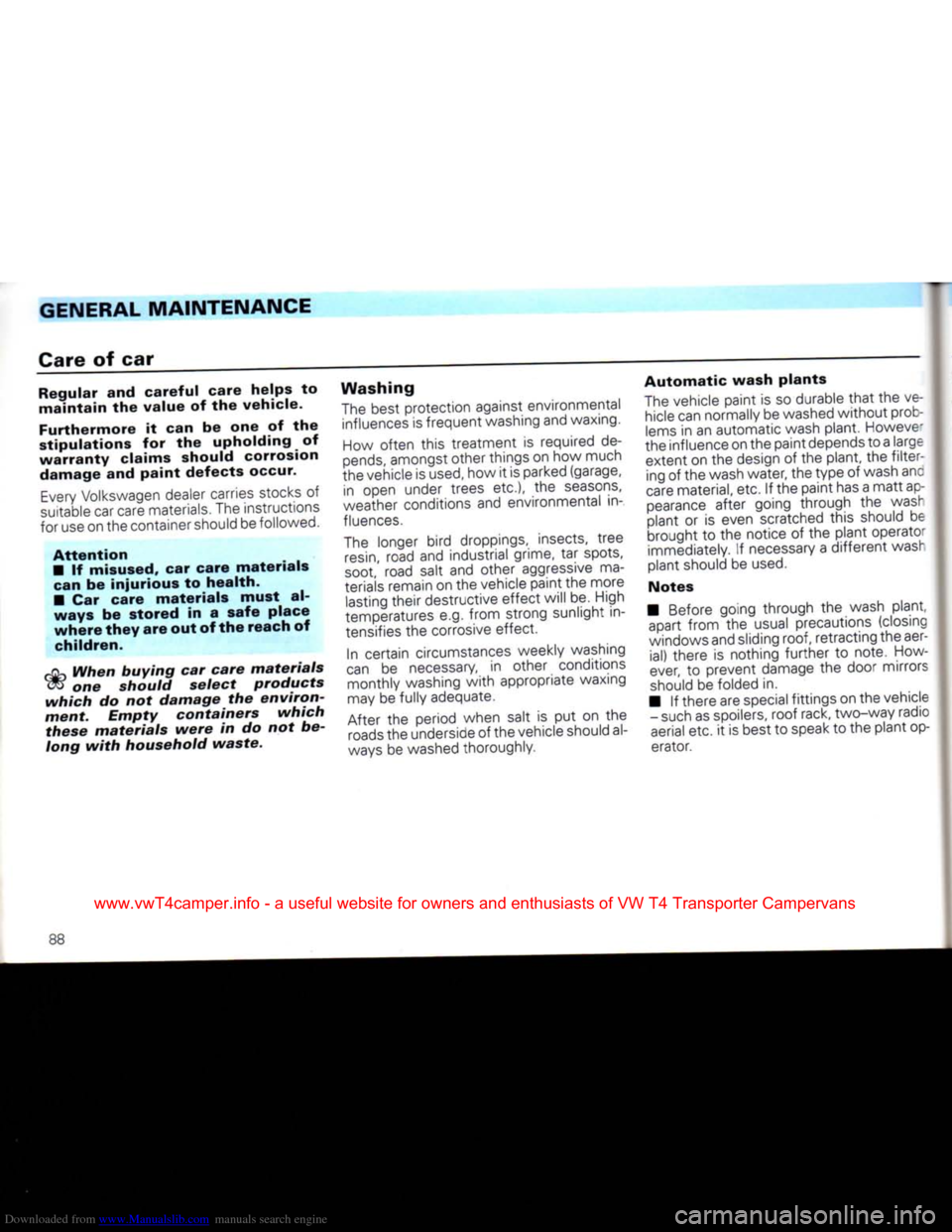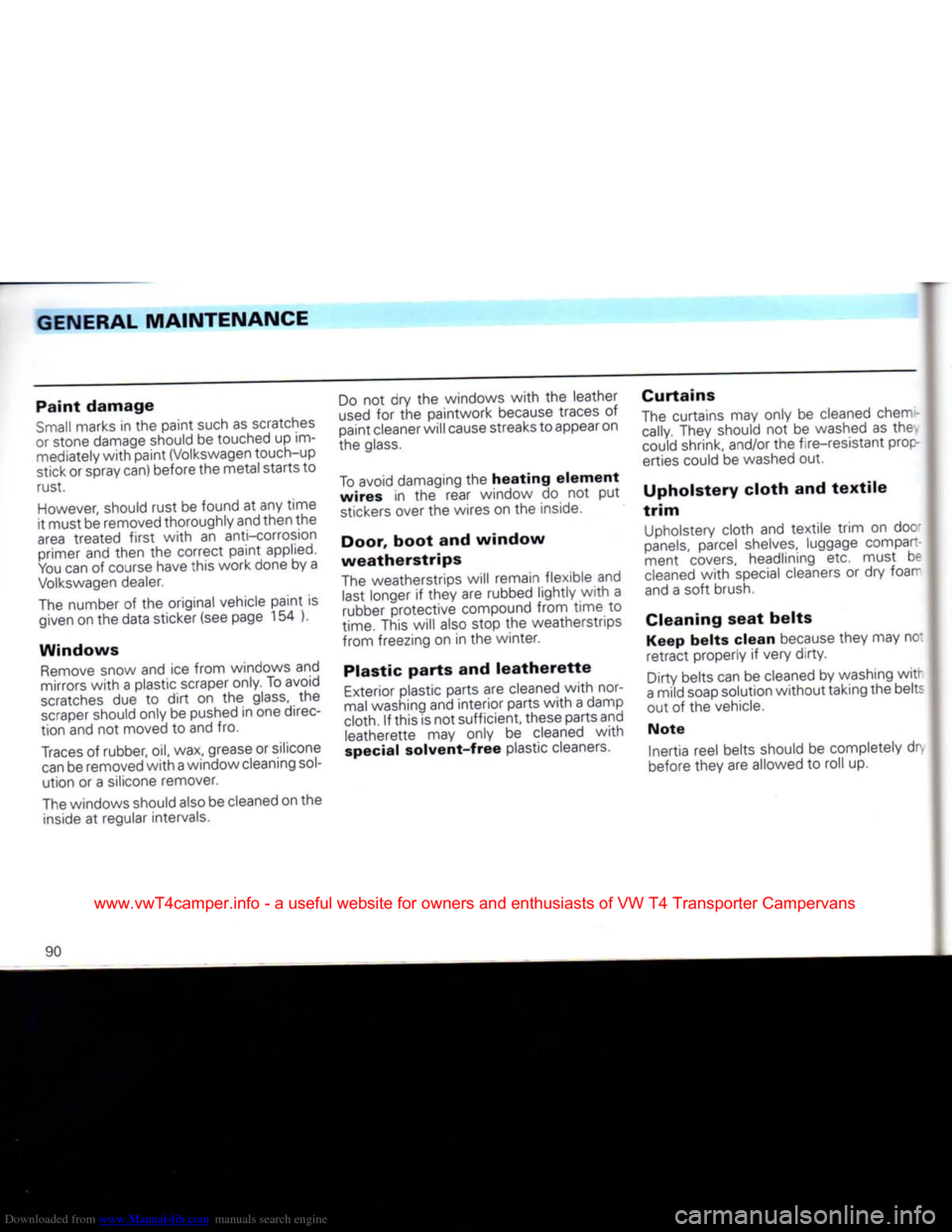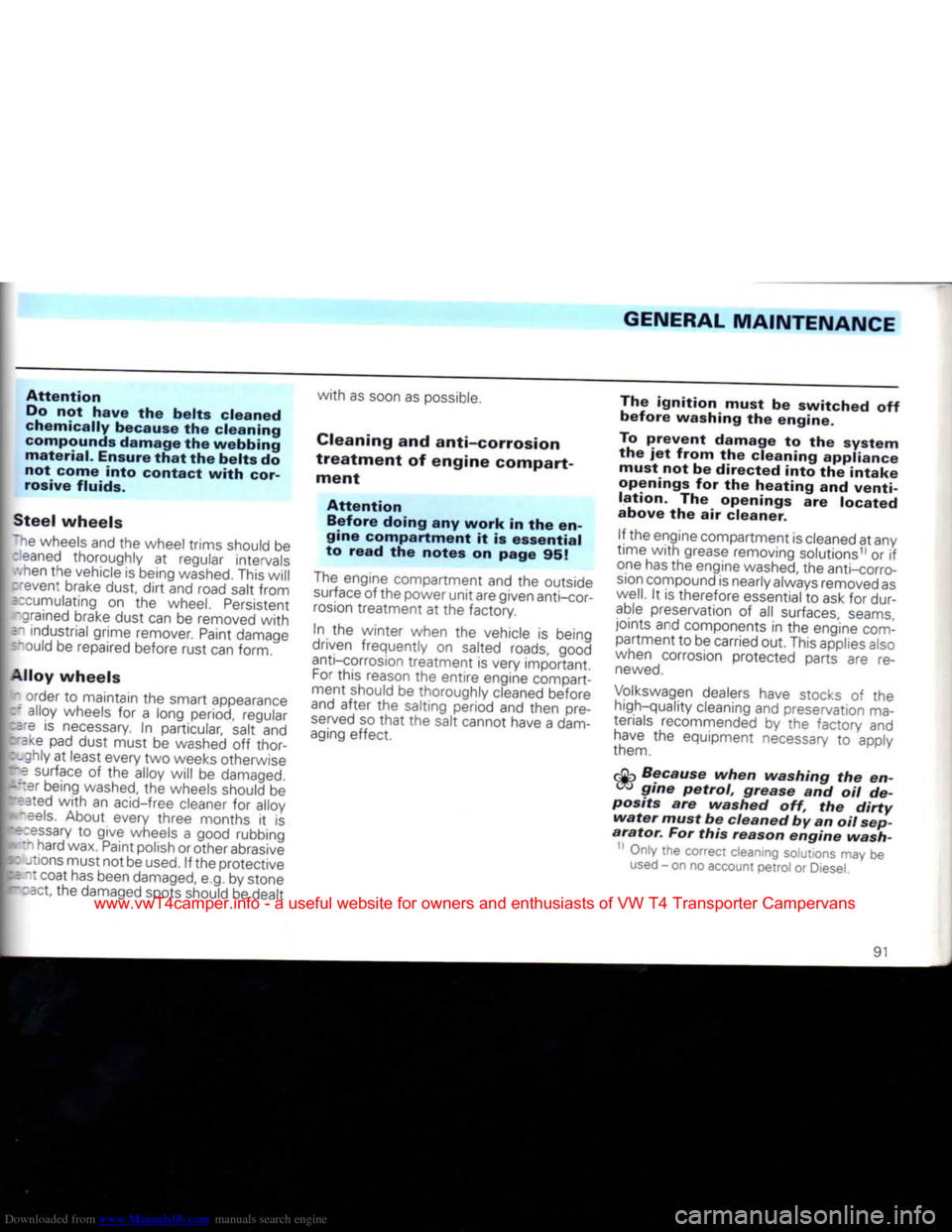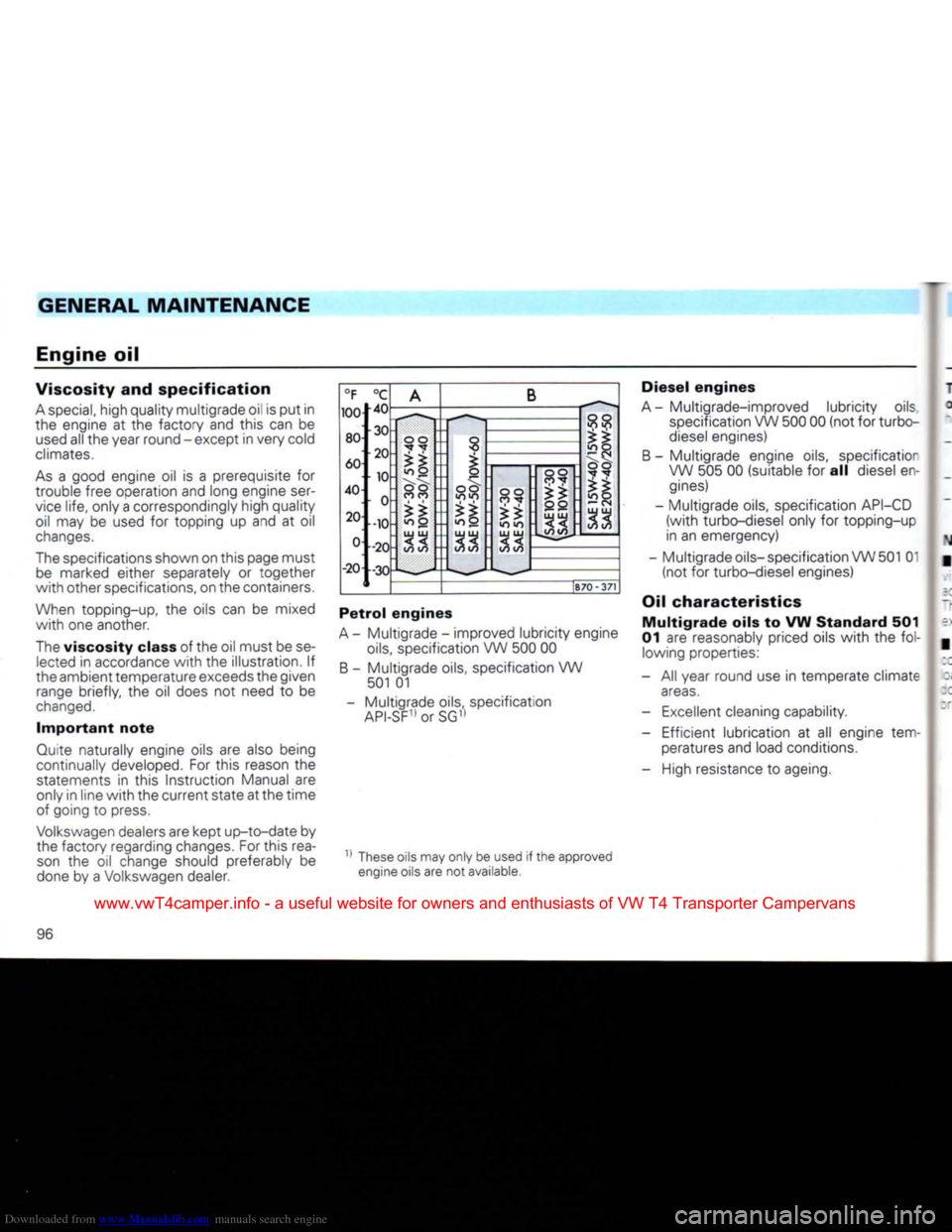1992 VOLKSWAGEN CARAVELLE engine oil
[x] Cancel search: engine oilPage 50 of 164

Downloaded from www.Manualslib.com manuals search engine
CONTROLS
AND EQUIPMENT
The
warning lamp flashes when ignition is
switched
on. the lamp must go out when
engine
has started.
If the warning lamp does not go out or
flashes
when driving - a buzzer also sounds
at engine speeds above 2000 rpm - stop,
switch
engine
off, check oil level and if
necessary,
add oil - see page 97.
If the lamp comes on although the oil level
is
in order, do not
drive
on. Do not even
run the engine at idling speed-call in expert
assistance.
Note
The oil pressure
warning
lamp
is not an oil
level
indicator.
The oil
level
should
therefore
be checked at reg
ular
intervals,
preferably
every
time
the
fuel
tank
is filled.
3 -
High
beams 10 4 - Turn signals
The
warning lampflashes when
turn
signals
are
switched on. If a
turn
signal fails, the
warning lamp flashes twice as fast. (Not
when towing a trailer).
Further
details are given on pages 49
and
52. 5 -
Brake
system «^
The
warning lamp comes on when
• the handbrake is on
• the brake fluid level is too low
The
ignition must be switched on.
Attention
If the
lamp
does not go out
when
handbrake
is released or comes
on
when
driving, the
fluid
level
in
the reservoir is too low. If an in crease in
pedal
free
travel
is no
ticed
at the same
time,
one of the
brake
circuits may
have
failed.
You can
drive
on
carefully
to the
nearest
Volkswagen
dealer
but
allow
for
higher
pedal
pressures and longer
braking
distances on
the way.
The
warning lamp comes on when high
beams
are on or when the headlight flasher
is
used.
48
www.vwT4camper.info - a useful website for owners and enthusiasts of VW T4 Transporter Campervans
Page 82 of 164

Downloaded from www.Manualslib.com manuals search engine
DRIVING
TIPS
The technical
prerequisites
"or
a low fuel consumption and efficiency were "built in" at the factory. Particular im
portance was placed on the lowest possible
disturbance
to the environment. To retain
and
make the best possible use of these
characteristics
attention should be paid to
the following points:
Vehicles
fitted
with
a
catalytic
converter
may
only
be
driven
on
unleaded
petrol.
Even
those
vehicles
which
do
not
have
a
catalytic
converter
should
be
driven
on
unleaded
petrol
for the
sake
of the
environment.
The
prescribed
maintenance
operations
should
be
carried
out
exactly
as
specified
in the
Service
Schedule - see
also
page
93.
Having your vehicle regularly serviced by
a Volkswagen dealer not
only
ensures
that
it is always operationally fit, but it
also ensures economy, lowest possible burden on the environment and a long
service
life.
Check the
tyre
pressures
every
4
weeks.
Low
tyre
pressures increase the rolling
resistance.
This not
only
increases the
fuel
consumption and
tyre
wear,
but the
handling is also impaired.
Do not
carry
unnecessary
ballast
in the
luggage
boot
Particularly in
town
traffic
when one has to accelerate
often,
weight
has a
great
in
fluence on the
fuel
consumption. As a
rule
of
thumb:
For every 100 kg of
weight
the consumption increases by approxi
mately
litre
per 100 km.
Remove
roof
rack
immediately
after
use
Particularly at
high
speeds the increased
air resistance makes
itself
felt
consider
ably.
gCK
Electrical
consumers
should
only
be
switched
on
when
they
are
actually
required
Heated rear windows, additional driving
lights
and heater blower consume a con
siderable amount of
current.
The higher
alternator
load
also increases the
fuel
consumption. For instance, over a period of 10 hours, the heated rear window
will
increase
the
fuel
consumption by ap
proximately 1
litre.
Check the
fuel
consumption
reg
ularly
The
fuel
consumption should be checked
each
time
the
tank
is
filled
up. By doing
this
inconsistencies on the vehicle which
lead to an increased
fuel
consumption
can be discovered sooner.
• Check the
engine
oil
level
each
time
the
tank
is
filled
up
The
oil consumption depends to a great ex
tent
on the engine load and
speed.
Depend
ing on the style of driving the consumption
can
be as much as 1.0 litres/1000 km.
It is normal for the oil consumption of a new
engine
to reach its lowest level after a cer
tain mileage has been covered. The
con
sumption cannot be properly
assessed
until
the vehicle has run approx. 5000 km.
This
also
applies to the fuel consumption
and
the engine output.
www.vwT4camper.info - a useful website for owners and enthusiasts of VW T4 Transporter Campervans
Page 90 of 164

Downloaded from www.Manualslib.com manuals search engine
GENERAL
MAINTENANCE
Care
of car
Regular
and
careful
care
helps
to
maintain
the
value
of the
vehicle.
Furthermore
it can be one of the
stipulations
for the
upholding
of
warranty
claims should corrosion
damage
and
paint
defects
occur.
Every
Volkswagen dealer carries stocks
of
suitable car care materials. The instructions
for use on the container should be followed.
Attention
•
If
misused,
car
care
materials
can
be
injurious
to
health.
•
Car
care
materials
must
al
ways
be
stored
in a
safe
place
where
they
are out of the
reach
of
children.
When
buying
car
care
materials
one
should
select
products
which
do not
damage
the
environ
ment.
Empty
containers
which
these
materials
were in do not be
long
with
household
waste.
Washing
The
best protection against environmental
influences
is frequent washing and waxing.
How
often this treatment
is
required
de
pends,
amongst other things on
how
much
the vehicle is
used,
how
it
is parked (garage, in open under trees etc.),
the
seasons,
weather conditions
and
environmental
in
fluences.
The
longer bird droppings, insects, tree
resin,
road
and
industrial grime,
tar
spots,
soot, road salt
and
other aggressive
ma
terials remain on
the
vehicle paint the more lasting their destructive effect will be. High
temperatures e.g. from strong sunlight
in
tensifies
the
corrosive effect.
In certain circumstances weekly washing
can
be
necessary,
in
other conditions monthly washing
with
appropriate waxing
may
be
fully adequate.
After
the
period when salt
is put on the
roads
the underside
of
the vehicle should al
ways
be
washed thoroughly.
Automatic
wash
plants
The
vehicle paint
is so
durable
that
the ve
hicle
can normally be washed without prob
lems
in an
automatic wash plant. Howeve'
the influence on the paint depends
to
a large extent
on the
design
of the
plant,
the
filter
ing
of
the wash water, the type
of
wash anc
care
material, etc.
If
the paint has a
matt
ap
pearance
after going through
the
wash
plant
or is
even scratched this should
be
brought
to the
notice
of the
plant operate
immediately.
If
necessary
a
different wash
plant should
be
used.
Notes
• Before going through
the
wash plant, apart from
the
usual precautions (closing
windows and sliding roof, retracting the aerial) there
is
nothing further
to
note. How
ever,
to
prevent damage
the
door mirrors
should
be
folded
in.
•
If
there are special
fittings
on the vehicle - such as spoilers, roof rack, two-way radio
aerial
etc.
it is
best
to
speak
to the
plant operator.
88
www.vwT4camper.info - a useful website for owners and enthusiasts of VW T4 Transporter Campervans
Page 92 of 164

Downloaded from www.Manualslib.com manuals search engine
GENERAL MAINTENANCE
Paint damage
Small marks in the paint such as scratches
or stone damage should be touched up im mediately with paint (Volkswagen touch-up
stick or spray can) before the metal starts to rust.
However, should rust be found at any time
it must be removed thoroughly and then the
area treated first with an anti-corrosion primer and then the correct paint applied.
You can of course have this work done by a
Volkswagen dealer.
The number of the original vehicle paint is given on the data sticker (see page 154 ).
Windows
Remove snow and ice from windows and
mirrors with a plastic scraper only. To avoid
scratches due to dirt on the glass, the
scraper should only be pushed in one direc
tion and not moved to and fro.
Traces of rubber, oil, wax, grease or silicone
can be removed with a window cleaning
sol
ution or a silicone remover.
The windows should also be cleaned on the inside at regular intervals. Do not dry the windows with the leather
used for the paintwork because traces of
paint cleaner will cause streaks to appear on
the glass.
To avoid damaging the
heating element
wires
in the rear window do not put
stickers over the wires on the inside.
Door, boot
and
window
weatherstrips
The weatherstrips will remain flexible and last longer if they are rubbed lightly with a
rubber protective compound from time to
time.
This will also stop the weatherstrips
from freezing on in the winter.
Plastic parts
and
leatherette
Exterior plastic parts are cleaned with nor
mal washing and interior parts with a damp
cloth.
If this is not sufficient, these parts and leatherette may only be cleaned with
special solvent-free
plastic cleaners.
Curtains
The curtains may only be cleaned chemi cally. They should not be washed as the.
could shrink, and/or the fire-resistant properties could be washed out.
Upholstery cloth
and
textile
trim
Upholstery cloth and textile trim on doc-
panels, parcel shelves, luggage compart ment covers, headlining etc. must be
cleaned with special cleaners or dry foarr
and a soft brush.
Cleaning seat belts Keep belts clean
because they may nc:
retract properly if very dirty.
Dirty belts can be cleaned by washing with
a mild soap solution without taking the belt; out of the vehicle.
Note
Inertia reel belts should be completely dr.
before they are allowed to roll up.
90
www.vwT4camper.info - a useful website for owners and enthusiasts of VW T4 Transporter Campervans
Page 93 of 164

Downloaded from www.Manualslib.com manuals search engine
GENERAL
MAINTENANCE
Attention
Do
not have the belts cleaned
chemically
because the cleaning
compounds
damage the webbing
material. Ensure
that
the belts do not come into contact
with
cor
rosive
fluids.
Steel wheels
~ne wheels and
the
wheel trims should
be
:!eaned
thoroughly
at
regular intervals .'.hen the vehicle
is
being washed. This
will
"event brake dust,
dirt
and road salt
from
•cumulating
on the
wheel. Persistent "grained brake dust can
be
removed
with
="
industrial grime remover. Paint damage ;~ould
be
repaired before rust can form.
Alloy wheels - order
to
maintain
the
smart appearance
• alloy wheels
for a
long period, regular pre
is
necessary.
In
particular, salt
and
•Bke
pad dust must
be
washed
off
thor-
cghly
at
least every two weeks otherwise re surface
of the
alloy
will
be
damaged.
-~er
being washed,
the
wheels should
be
~f3ted
with
an
acid-free cleaner
for
alloy
"eels.
About every three months
it is
"f:essary
to
give wheels
a
good rubbing
». :n hard wax. Paint polish or other abrasive
•c
„tions must not be
used.
If
the protective
BE
-.t
coat has been damaged, e.g. by stone react,
the
damaged spots should be dealt
with
as soon
as
possible.
Cleaning and anti-corrosion
treatment
of
engine compart ment
Attention Before doing any
work
in the en
gine compartment it is essential
to read the notes on page 95!
The
engine compartment and
the
outside
surface
of
the power
unit
are given anti-cor
rosion treatment
at the
factory.
In
the
winter when
the
vehicle
is
being
driven frequently
on
salted roads, good
anti-corrosion treatment
is
very important.
For
this reason
the
entire engine compart
ment should
be
thoroughly cleaned before
and after
the
salting period
and
then pre
served
so
that
the
salt cannot have
a
dam
aging effect. The
ignition must be switched off
before washing the engine.
To
prevent damage to the system
the jet from the cleaning appliance must not be directed into the
intake
openings
for the heating and ventilation. The openings are located
above the air cleaner.
If
the engine compartment is cleaned
at
any
time
with
grease removing solutions1'
or if
one has the engine washed, the anti-corro
sion
compound is nearly always removed as
well.
It is
therefore essential
to
ask
for
dur
able
preservation
of all
surfaces,
seams,
joints
and components
in the
engine com partment
to
be carried out. This applies also
when corrosion protected parts
are re
newed.
Volkswagen
dealers have stocks
of the
high-quality cleaning and preservation ma
terials recommended
by the
factory
and
have
the
equipment necessary
to
apply
them.
Because
when
washing
the en
gine
petrol,
grease
and oil de
posits
are
washed
off, the
dirty
water
must
be
cleaned
by an oil
sep
arator.
For
this
reason
engine
wash-
11
Only
the
correct
cleaning
solutions may
be
used
-
on no account petrol
or
Diesel.
91
www.vwT4camper.info - a useful website for owners and enthusiasts of VW T4 Transporter Campervans
Page 95 of 164

Downloaded from www.Manualslib.com manuals search engine
GENERAL
MAINTENANCE
Maintenance
-s
the
vehicle
is
fitted
with
modern
low
~aintenance
technical components only
small
amount
of
regular servicing
is re
tired
in
order
to
maintain
the
roadworthi-
"sss,
economy and reliability.
~ne Inspection Service offered by the Vol ks-
I
agen dealers takes into account
to a
large
extent
the
individual annual mileage
cov-
e-ed and helps thus
to
keep
the
operating
:osts
as
low as possible.
Regular maintenance helps to
-J
ensure
that
the emissions - and
thus the environmental burden are
kept
as low as possible.
The
Inspection
Service
is
required
every
12
months
or
every
30 000 km,
. nichever occurs
first.
I
a mileage
of
15 000
km
(petrol engines)
or
"500
km
(Diesel engines)
is
reached before "2 months
has
elapsed,
the Oil
change
Service must
be
carried out. See page
98
5
so and
the
Service Schedule.
~ie Service Schedule also shows what »rk
is
done
at the
Inspection
and Oil
Inange
Services.
In
arduous
operating
conditions, e.g.
extremely low ambient temperatures, very
dusty conditions etc. certain service oper
ations should be carried
out
between the in
tervals specified.
This
applies
in
particular
to:
• Changing
the
engine
oil
• Cleaning
or
changing
the air
cleaner
el
ement
• Draining water from
or
renewing the fuel
filter
on the
Diesel engine
The
service operations should be carried out by
a
Volkswagen dealer because this work
requires specialist knowledge, workshop
equipment and special tools. Furthermore
this work must
be
done
in
accordance
with
out instructions.
Complete
proof
of
servicing
by a
Volks
wagen dealer can be one
of
the stipulations
for
the
upholding
of any
warranty claims during
the
one year warranty period.
Attention
Safety
regulations
place
very
strict
limits
on the
amount
of re
pairs
and
adjustments
to
engine
and
running
gear
parts
which
can
be
done
by the
owner.
By
tinker
ing
with
parts
which affect
the
safety
of a
motor
vehicle
one can
endanger
oneself
and
other road users.
Altering the engine settings is detrimental to the
exhaust
emissions.
This means
that
the envi
ronment is burdened unnecessarily
and the
fuel
consumption
also
in
creases.
The disposal of old oil, used brake
fluid,
dirty
coolant, defective
bat
teries or worn-out tyres etc. must be
done according to environmental
protection regulations. It is even
better
if old operating fluids and parts are used
again
and
do not become a burden on the envi
ronment. Through "recycling" valu
able
raw-materials and
energy
are
saved and at the same
time
it re lieves the load on the toxic waste
dumps.
Volkswagen dealers collect
all reusable materials and parts and
passes
them
on to the correct
agency
for recycling.
www.vwT4camper.info - a useful website for owners and enthusiasts of VW T4 Transporter Campervans
Page 97 of 164

Downloaded from www.Manualslib.com manuals search engine
GENERAL
MAINTENANCE
Engine
compartment
Page
Windscreen
washer
container
.. 108
Power
assisted
steering
fluid
reservoir*
100
Engine
oil filler
opening
97
Engine
oil
dipstick
97
Coolant
expansion
tank 102
Brake
fluid
reservoir
104
Battery
106 Attention
Particular care should be
taken
when working in the engine
com
partment!
•
Switch off engine, remove ignition key.
•
Pull handbrake on firmly.
•
Move gear lever into neutral or
"P"
position.
•
Allow engine to cool off.
•
As long as the engine is at op
erating temperature:
-
Do not put your hand into the radiator fan, it could switch on
suddenly.
-
Do not open the radiator cap be
cause
the cooling system is
under
pressure.
•
Avoid causing short circuits in
the electrical system - particular ly at the
battery
-.
•
If tests have to be
carried
out
with
the engine running,
there
is
an additional danger
present
from rotating parts - e.g.
V-belts,
generator, radiator fan etc. - and
from the high voltage ignition
system.
Attention must be paid to the warnings given in this Instruc
tion Manual and to the generally
applicable
safety regulations.
When topping up fluids one
should
ensure
that
they are not mistaken,
one
for the other, under any
circum
stances,
otherwise serious
func
tional defects
will
result.
So
that
leaks
are quickly de
tected
the ground underneath
the vehicle should be checked
reg
ularly.
If spots as caused by oil or
other
operating fluids can be seen, the vehicle should be
taken
to the
workshop for checking.
www.vwT4camper.info - a useful website for owners and enthusiasts of VW T4 Transporter Campervans
Page 98 of 164

Downloaded from www.Manualslib.com manuals search engine
GENERAL
MAINTENANCE
Engine oil
T
Viscosity and
specification
A
special,
high quality multigrade oil is put in
the engine at the factory and this can be
used
all the year round - except in very cold
climates.
As
a good engine oil is a prerequisite for
trouble free operation and long engine ser
vice
life, only a correspondingly high quality oil may be used for topping up and at oil
changes.
The specifications shown on this page must be marked either separately or together
with
other specifications, on the containers.
When topping-up, the oils can be mixed
with
one another.
The viscosity class of the oil must be se lected in accordance
with
the illustration. If
the ambient temperature exceeds the given range briefly, the oil does not need to be
changed.
Important
note
Quite naturally engine oils are also being
continually developed. For this reason the statements in this Instruction Manual are
only in line
with
the current state at the time
of going to press.
Volkswagen
dealers are kept up-to-date by the factory regarding changes. For this
rea
son
the oil change should preferably be
done by a Volkswagen dealer. F
100
80-
60-
40-
20 0
•20-
-30
o
o
$i
in
o
o
6
CO
CO
ii
in
O
LU UJ < <
CO oo
o
-o
i
OO'
in
u->
in
O
LU LU < <
OO OO
o
o
CO
m
in
LU LU
< <
OO OO
OO
CO
£5
o
o
3 J
in
o
— CN
LU LU
OO OO
Petrol
engines
A
- Multigrade - improved lubricity engine
oils,
specification VW 500 00
B
- Multigrade oils, specification VW 501 01
- Multigrade oils, specification
API-SF^orSG11
Diesel
engines
A
- Multigrade-improved lubricity oils specification VW 500 00 (not for turbo-
diesel
engines)
B
- Multigrade engine oils, specification
VW
505 00 (suitable for all diesel engines)
- Multigrade oils, specification
API-CD
(with
turbo-diesel only for topping-up
in an emergency)
- Multigrade oils-specification VW 501 0': (not for turbo-diesel engines)
Oil
characteristics
Multigrade
oils to VW
Standard
501
01 are reasonably priced oils
with
the fol lowing properties:
- All year round use in temperate climate
areas.
- Excellent cleaning capability.
- Efficient lubrication at all engine tem peratures and load conditions.
- High resistance to ageing.
11 These oils may only be used if the approved engine oils are not available.
96
www.vwT4camper.info - a useful website for owners and enthusiasts of VW T4 Transporter Campervans